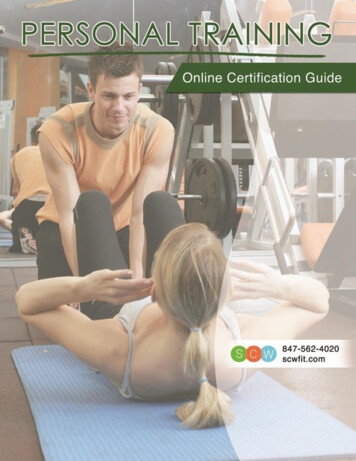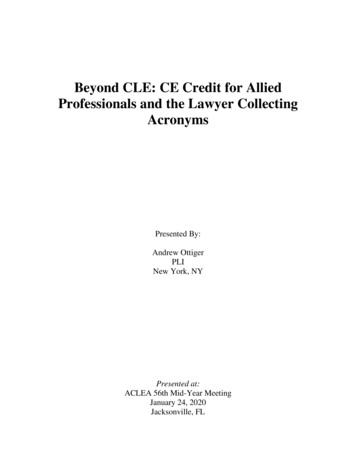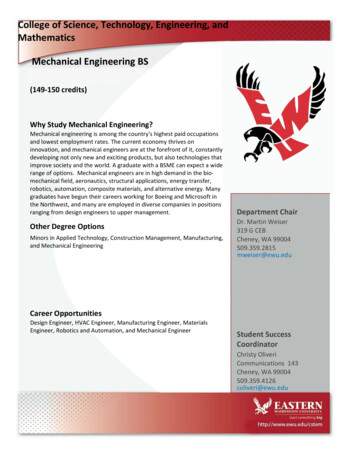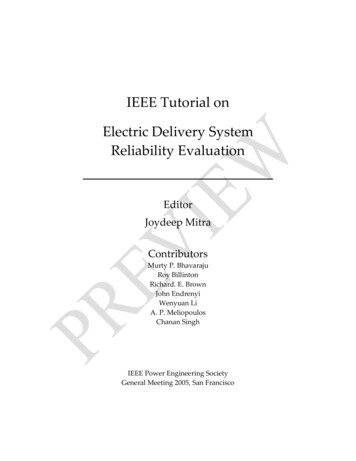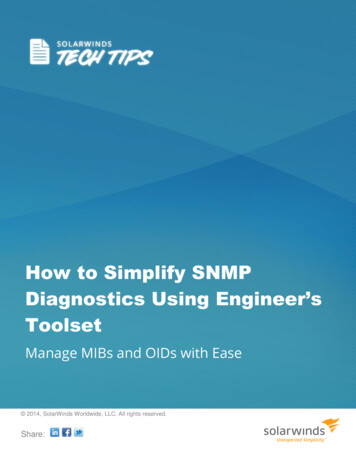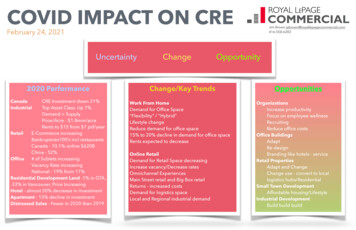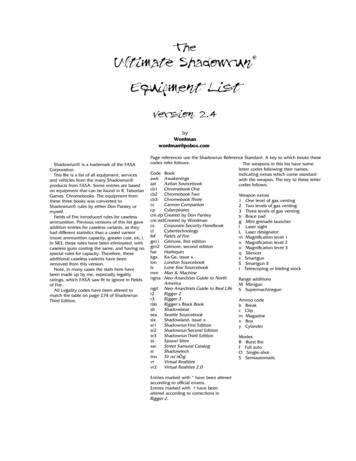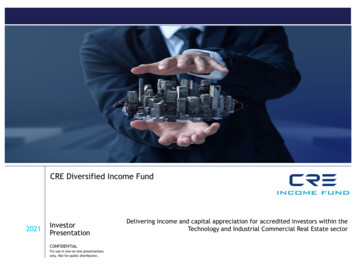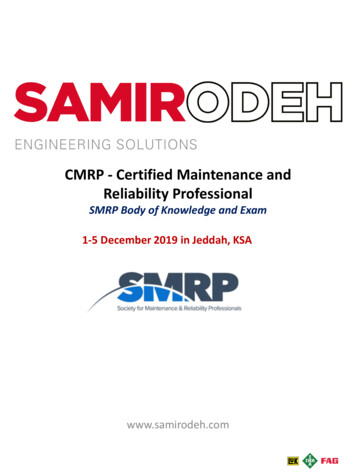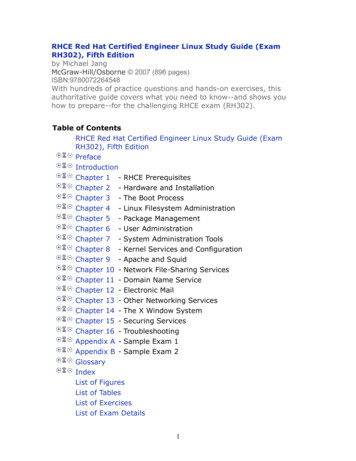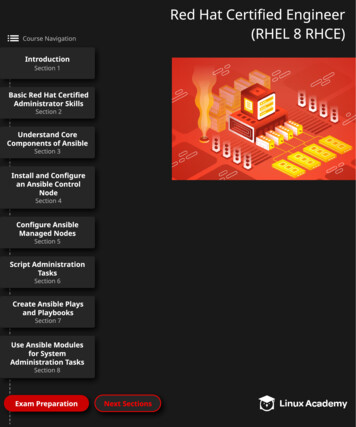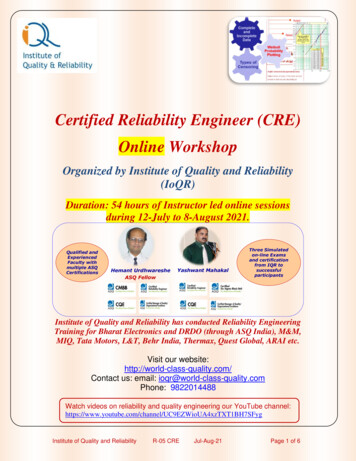
Transcription
Certified Reliability Engineer (CRE)Online WorkshopOrganized by Institute of Quality and Reliability(IoQR)Duration: 54 hours of Instructor led online sessionsduring 12-July to 8-August 2021.Qualified andExperiencedFaculty withmultiple ASQCertificationsHemant UrdhwaresheASQ FellowYashwant MahakalThree Simulatedon-line Examsand certificationfrom IQR tosuccessfulparticipantsInstitute of Quality and Reliability has conducted Reliability EngineeringTraining for Bharat Electronics and DRDO (through ASQ India), M&M,MIQ, Tata Motors, L&T, Behr India, Thermax, Quest Global, ARAI etc.Visit our website:http://world-class-quality.com/Contact us: email: ioqr@world-class-quality.comPhone: 9822014488Watch videos on reliability and quality engineering our YouTube 4xzTXT1BH7SFygInstitute of Quality and ReliabilityR-05 CREJul-Aug-21Page 1 of 6
Institute of Quality and Reliability (IQR)AnnouncesOnline Reliability Engineer Workshop(Focused on preparation for ASQ Certification)On-line Schedule :Note: We will additionally send prereading material and links to many useful videos andrelated quizzes. Participants need to go through these as a part of the workshop. This isnecessary as the CRE body of knowledge (BOK) is vast and virtual classroom time islimited to 60 hours.Introduction:Assuring Reliability of new products is a major challenge for senior management of mostorganizations. This Reliability Engineering workshop is designed to provide in-depthunderstanding of Reliability Engineering Basics, Life Data Analysis, Reliability in Design,Reliability Testing, Maintainability and Availability and various Statistical Techniques. Formore details, see agenda of the workshop in this brochure.According to American Society for Quality (ASQ): “The Certified Reliability Engineer(CRE) is a professional who understands the principles of performance evaluation andprediction to improve product/systems safety, reliability, and maintainability.” The CREBody of Knowledge (BOK) and applied technologies include, but are not limited to,design review and control; prediction, estimation, and apportionment methodology;failure mode and effects analysis; the planning, operation, and analysis of reliabilitytesting and field failures, including mathematical modeling; understanding human factorsin reliability; and the ability to develop and administer reliability information systems forfailure analysis, design, and performance improvement and reliability programmanagement over the entire product life cycle.”Institute of Quality and ReliabilityR-05 CREJul-Aug-21Page 2 of 6
This workshop is designed based on CRE BOK published by American Society forQuality. The course material includes a soft copy of training material from Institute ofQuality and Reliability. Online training is supported with exercises and tutorials.Participants are expected to keep scientific calculators and laptop computers availableduring training for effective learning. Some of the hands-on exercises are designed usingMinitab Software and templates so that participants can analyze their own data aftercompleting the workshop.Who should attend the training?The course is most appropriate for engineers and managers involved in Design and/or Development of New Products Reliability Testing of Products Quality Assurance and improvement of current and new products Warranty Data Analysis and improvement Problem Solving and Quality/Reliability Improvement Maintenance EngineeringConsidering the course contents, it is expected that participants should have basicunderstanding of business processes, should be able to use scientific calculators andcomputers, and should have knowledge of basic mathematics and science.Agenda for the Training:Workshop will be conducted as per CRE body of knowledge (BOK) prescribed byAmerican Society for Quality (ASQ). However, the workshop will focus on thetopics that are somewhat difficult to understand without faculty communication.The ASQ BOK is vast and may not be completely covered in a 54-hourworkshop. We will also provide links to more than 30 videos to complement theonline sessions.The course will cover ASQ BOK which is divided in to five main clauses:1. Reliability fundamentals2. Risk Management3. Statistics and Probability for Reliability4. Reliability Planning, testing and modelling5. Life Cycle ReliabilityBody of knowledge can be downloaded from https://asq.org/cert/reliability-engineer.Test of Comprehension: After completing the workshop, participants will get access totwo on-line simulated exams and one online final Certification Exam of 150 questions.These are in addition to practice questions given during the workshop. Participantspassing the test with the threshold set by the institute will get certified as ReliabilityEngineer from IoQR. (For certification, the final test will be under camera and aGovernment photo ID required.)Requirements for ASQ Certification: To appear for ASQ certification exam, ifparticipants are a graduate, they must have four years of on-the-job experience in one ormore of the areas of the CRE BOK. A minimum of three years of this experience mustbe in a decision-making position For more information about ASQ certification, visitweb lty:Institute of Quality and ReliabilityR-05 CREJul-Aug-21Page 3 of 6
Mr. Hemant Urdhwareshe, is the Principal Consultant and Director Institute of Quality andReliability (IQR).Hemant has total 43 years of experience including 28-years inManufacturing, Quality and Engineering at Cummins India Limited (CIL) and 15 years as atrainer and principal consultant at IQR. As Head of Quality, Reliability and subsequentlyEngineering functions at CIL, Hemant was actively involved in driving Reliability Improvement andSix Sigma programs and has led and sponsored many complex reliability improvement projects.He has applied various Reliability and Six Sigma tools in reducing field failures and improvingNew Product Reliability. Hemant has conducted numerous CRE and Six Sigma training programsfor many large company such as Ashok Leyland, Tata Motors, M&M, MIQ, Bosch, L&T, BEL(*),DRDO(*) (*both through ASQ India), TAFE, Thermax, Quest Global, ARAI, Dana, SAP Parts etc.He was a panelist for the Lean Six SigmaAwards organized by Symbiosis Center forManagementandHumanResourceDevelopment (SCMHRD). Hemant was avisiting faculty at Symbiosis Institute ofBusiness (SIBM) Management for Six Sigmaand Business Statistics. He has authored abook ‘Six Sigma for Business Excellence’which was published by Pearson Education inSeptember 2010. He has also coauthored thebook ‘Total Quality Management’ which hasbeen published in October 2010 with his wifeRashmi.He is: A Fellow of American Society for Quality (ASQ), recipient of Silver Standard 2003award from Qimpro Foundation for outstanding Quality Manager in India and QualityChampion Silver Award 2018 from QCI-DL Shah Trust The first Six Sigma Master Black Belt in India certified by American Society for Quality(ASQ) as on 5 December 2010 The first ASQ Certified Quality Manager in India (1998) ASQ Certified Quality Engineer (1996) and ASQ Certified Reliability Engineer (2005) The first person in India with five or more certifications from ASQ Fellow of IIPE and Senior Life Member of National Center for Quality Management. (NCQM). Qualified Lead AssessorMr.Yashwant Mahakal is a mechanical engineer from VJTI with rich experience inAutomotive and Engineering Industries including TATA Motors, Fleet guard Filters(Cummins Group), Filtrum Tools, TACO Group, Veena Industries in the areas ofLean Manufacturing Systems / Quality Assurance / Quality Management Systems/Product Development / Supplier Development and Costing. He has four years ofconsulting experience in the Areas of Lean Manufacturing and QualityManagement Systems. He has successfully implemented many lean manufacturing projects.He is certified by American Society for Quality (ASQ) as: Six Sigma Black Belt (CSSBB) Quality Engineer (CQE) Manager of Quality and Organizational Excellence (CMQ.OE) and Reliability Engineer. (CRE)Yashwant is also certified as Lead Assessor for Quality Management Systems (ISO9001:2008), Environmental Management Systems ISO14001:2008 and OHSAS18001:2007.Course Material:Institute of Quality and ReliabilityR-05 CREJul-Aug-21Page 4 of 6
1. Comprehensive workshop material from IQR will be sent by email. Participantscan print one copy only for their own reference. Training material isnontransferable.2. Many useful templates and data files by IQR.Course Fees:Refer registration form for details of course fees.Payment:Registration will be confirmed after payment by to “Institute of Quality and Reliability,Pune”. Payment can be made on-line to our Bank details are provided on registrationform. Alternately, payment can also be made on PayPal in case of US . Please requestfor PayPal Invoice from us.Institute of Quality and ReliabilityR-05 CREJul-Aug-21Page 5 of 6
About Institute of Quality and Reliability:Institute of Quality and Reliability (IQR) was established in November 2005, with primaryobjective to help Industries for improving their business performance. IQR also supportsindividuals aspiring to improve their knowledge and skills in Quality and Reliability. After28 years of rich industrial experience in the Industry, at Cummins India Ltd. (CIL),Hemant Urdhwareshe decided to start IQR. So far, we have trained about 500 reliabilityengineers and more than 5500 individuals in the field of Quality and Reliability.For registration or more information Contact us:Institute of Quality and ReliabilityPlot No.39, Shantiban SocietyNear Gandhi BhavanKothrud, Pune 411038.Phone:Hemant Urdhwareshe: 919822014488Yashwant Mahakal: 919960270692Note: Send SMS or WhatsApp message in case phone is not reachable or notanswered.Email: hemant@world-class-quality.comWeb site: www.world-class-quality.comWe are proud to be associated with our Customers:Institute of Quality and ReliabilityR-05 CREJul-Aug-21Page 6 of 6
The ASQ BOK is vast and may not be completely covered in a 54-hour workshop. We will also provide links to more than 30 videos to complement the online sessions. The course will cover ASQ BOK which is divided in to five main clauses: 1. Reliability fundamentals 2. Risk Ma
